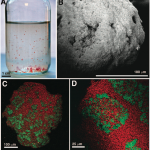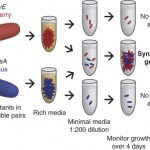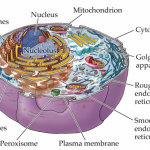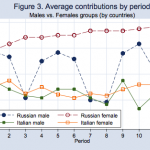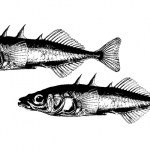Cooperation
One organism's trash is another organism's treasure. Our cellular wastes, carbon dioxide and water, nourish plants, which with added energy from sunlight produce the oxygen and sugars that we need to survive. At microscopic scales, these cycles of waste and food can get much more complicated, with many species of microbes working together to survive in harsh environments with limited nutrients.
When organisms (like us) digest sugars made of carbon (C), hydrogen (H), and oxygen (O), they split them up into carbon dioxide (CO2), hydrogen ions (H+) and high-energy electrons (e-) that were…
My good friend and labmate just published an awesome paper: "Emergent cooperation in microbial metabolism." His experiment started with 46 strains of E. coli that had mutations in their metabolic pathways that prevented them from being able to grow without supplementing the media with extra metabolites. Alone they died, but grown together in the same tube, many pairs of mutants were able to feed each other the missing metabolite. Metabolic cooperation was the key to survival.
Measuring and understanding metabolic cooperation can be used to build stronger, more predictive models of…
Cells are constantly jibber jabbering, sending messages to each other to coordinate behavior, both within a population of single-celled organisms or between cells of an individual multicellular organism. Most of these signals are chemicals that float around in the liquid that surrounds the cells but there recently has been an increased appreciation for cells' sense of "smell"--how cells respond to chemicals that are present as gasses.
A brand new paper outlines the discovery of "olfaction" in a species of bacteria, Bacillus licheniformis. Trying to save space on a 96 well dish by putting…
I love this quote from the XKCD blog:
The role of gender in society is the most complicated thing I've ever spent a lot of time learning about, and I've spent a lot of time learning about quantum mechanics.
Many scientists try very hard to de-emphasize this complexity, trying to reduce "human nature" down to parts and genes and behaviors that can be explained by evolutionary mechanisms, by hormones, by genetics. It's not nature vs. nurture and it's not just male and female, it's nature and nurture and infinite variations along a culturally and biologically mediated gender continuum. By…
I read R.C. Lewontin's Biology as Ideology: The Doctrine of DNA over the weekend and was struck in particular by one line in his wonderful diatribe against biological determinism and reductionism:
"Intellectuals in their self-flattering wish-fulfillment say that knowledge is power, but the truth is that knowledge further empowers only those who have or can acquire the power to use it."
This is something that was really hard to read at first, especially as someone who is overeducated and clearly spends a lot of time thinking about educating other people about science. But I realized that it…
Animal cells are made up of many smaller membrane-bound compartments called organelles that perform highly specialized functions necessary for life. Incredibly, several of these organelles have been shown to be evolutionarily related to free-living bacteria, captured and incorporated inside a larger cell billions of years ago in a complex mutually beneficial relationship, known as endosymbiosis (a partnership between two species where one of the species is inside the other). The mitochondria that power our cells, generating energy by breaking down sugars are in fact relatives of regular old…
Ever wonder if acts of kindness or malice really do ripple outwards? If you give up a seat on a train to a stranger, do they go onto "pay it forward" to others? Likewise, if you steal someone's seat, does the bad mood you engender topple over to other people like a set of malicious dominoes? We'd all probably assume that the answers to both questions were yes, but James Fowler and Nicholas Christakis think they have found experimental evidence for the contagious nature of cooperation and cheating.
The duo analysed data from an earlier psychological experiment by Ernst Fehr and Simon Gachter…
In addition to their notorious beauty, there could be another reason to mail-order a Russian bride. In a study that compared donations to a public goods game by Russian and Italian men and women, Russian females were constantly and, more interesting, increasingly cooperative.
The experiment involved 12 Russians and 12 Italians, made up equally of both genders, who played a public goods game on a computer. Each player started every new round with 10 'currency units' -- which the experimenters would then translate into extra credit in their course. Players have choice of donating none, a…
PLoS Biology reviews Why We Cooperate:
What makes us human, what sets us apart from other animal species, and which traits do we share with our closest living relatives? Ever since Darwin introduced the notion of continuity in his theory of evolution, humans have been obsessed with the question of how to distinguish themselves from all other species. In the postwar period, our species became known as "Man the Toolmaker," until in the 1960s Jane Goodall watched chimpanzees using sticks to fish for termites, and that was that. We then distinguished ourselves using the term "Man the Hunter," but…
Cooperation and altruism are widespread in biology, from molecules and genes working together in a cell, to bacterial communities that require coordinated behavior to survive in a tough environment, to human relationships and societies. Our human cultural perspective (perhaps even more specifically our American cultural perspective, focused as it is on individuality, free markets, and the American Dream), however, treats cooperation as an outright anomaly that has to be explained away by science (or often, religion). If natural selection is about the "survival of the fittest" how can a…
If someone at âyour workplace offends a client or a customer, they'd probably get an earful from their colleagues or boss. If someone annoys a friend of yours, you'd probably have a go at them. This capacity to punish those who behave badly, even if they haven't wronged us personally, pervades all aspects of human society. And we're not the only ones - fish punish bad behaviour too.
The bluestreak cleaner wrasse (Labroides dimidiatus) operates an underwater health spa for larger fish. It advertises its services with bright colours and distinctive dances. When customers arrive, the cleaner…
Today President Obama accepted the Nobel Peace Prize "for his extraordinary efforts to strengthen international diplomacy and cooperation between peoples." Obama might, in fact, be cooperating too much with the status quo left by his predecessors. Earlier this year, some of Obama's most devoted supporters were most upset by the Administration's stance to uphold the same secrecy and immunity claims made during the Bush Administration and his reversal of his pledge to release photographs of detainee abuse in U.S. prisons abroad. And then, of course, there is the the irony that his Peace…
On Nicobar Island, in the Indian Ocean, a most unusual hunting party is searching for food. Through the branches of the forest, the tiny Nicobar treeshrew scuttles about searching for insects. They're followed by the racket-tailed drongo, a small bird that picks off juicy morsels flushed out by the foraging treeshrews. So far, this isn't unusual - many distantly related animals forage together, either because they net more food or because they can watch out for predators.
But this alliance has a third an altogether more surprising member - a sparrowhawk. This bird of prey is five times…
What do you think a group of women would do if they were given a dose of testosterone before playing a game? Our folk wisdom tells us that they would probably become more aggressive, selfish or antisocial. Well, that's true... but only if they think they've been given testosterone.
If they don't know whether they've been given testosterone or placebo, the hormone actually has the opposite effect to the one most people would expect - it promotes fair play. The belligerent behaviour stereotypically linked to testosterone only surfaces if people think they've been given hormone, whether they…
This article is reposted from the old Wordpress incarnation of Not Exactly Rocket Science.
Two years ago, Sarah Brosnan and Frans de Waal at the Yerkes National Primate Research Center found that brown capuchin monkeys also react badly to receiving raw deals. Forget bananas - capuchins love the taste of grapes and far prefer them over cucumber. If monkeys were rewarded for completing a task with cucumber while their peers were given succulent grapes, they were more likely to shun both task and reward.
That suggested that the human ability to compare own efforts and rewards with those of our…
Oscar Wilde once said, "One can survive everything nowadays, except death, and live down anything, except a good reputation." All well and witty, but for those of us who aren't Victorian cads, reputation matters. It's the bedrock that our social lives are built upon and people go to great lengths to build and maintain a solid one. A new study shows that our ability to do this involves the right half of our brain, and particularly an area called the lateral prefrontal cortex (PFC).
Disrupting the neurons in this area hampers a person's ability to build a reputation while playing psychological…
Hardly a natural history documentary goes by without some mention of leafcutter ants. So overexposed are these critters that I strongly suspect they're holding David Attenborough's relatives to ransom somewhere. But there is good reason for their fame - these charismatic insects are incredibly successful because of their skill as gardeners.
As their name suggests, the 41 species of leafcutter ants slice up leaves and carry them back to their nests in long columns of red and green. They don't eat the leaves - they use them to grow a fungus, and it's this crop that they feed on. It's an old…
As a species, we hate cheaters. Just last month, I blogged about our innate desire to punish unfair play but it's a sad fact that cheaters are universal. Any attempt to cooperate for a common good creates windows of opportunity for slackers. Even bacteria colonies have their own layabouts. Recently, two new studies have found that some bacteria reap the benefits of communal living while contributing nothing in return.
Bacteria may not strike you as expert co-operators but at high concentrations, they pull together to build microscopic 'cities' called biofilms, where millions of individuals…
This article is reposted from the old Wordpress incarnation of Not Exactly Rocket Science. The blog is on holiday until the start of October, when I'll return with fresh material.
In your garden, there's a fair chance that a farmer is currently tranquilising her livestock with a chemical cocktail she secretes from her feet. Don't believe me? Look closer...
Humans aren't the only species that farms other animals for food - ants do it too and their herds consist of aphids. They feed on plant sap and excrete a sweet and nutritious liquid called honeydew, which the ants drink.
In…
